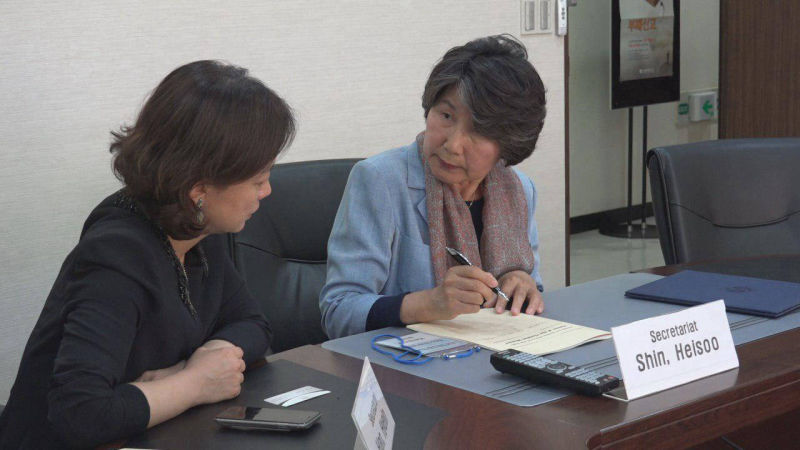
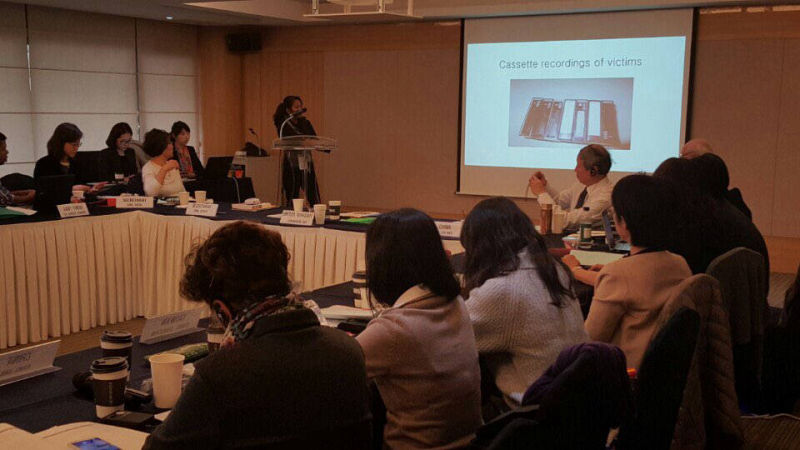
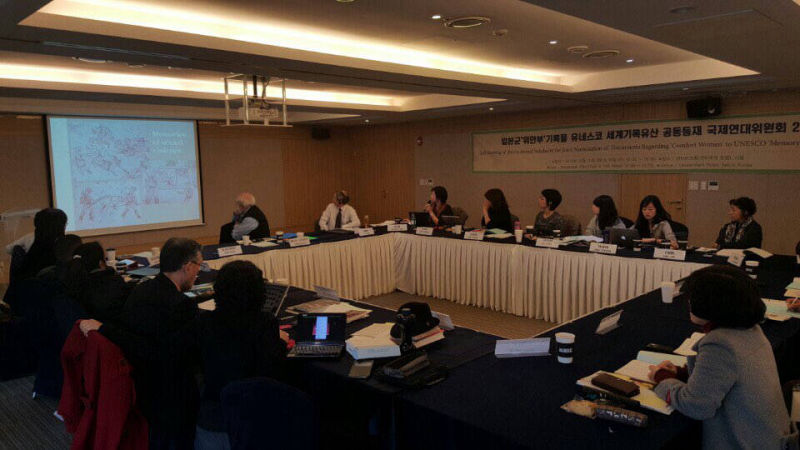
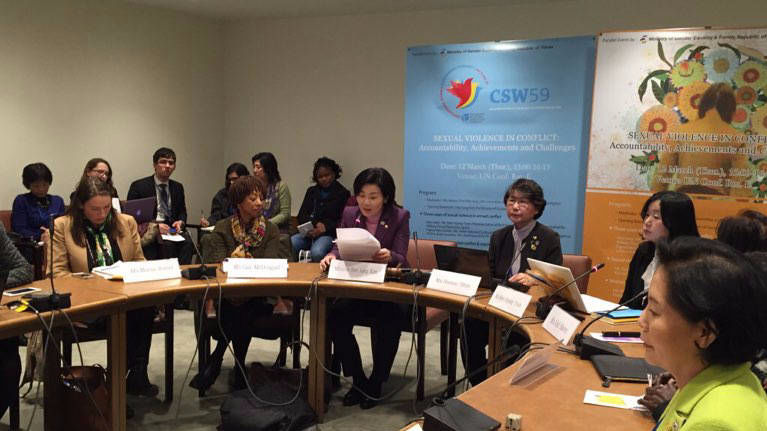
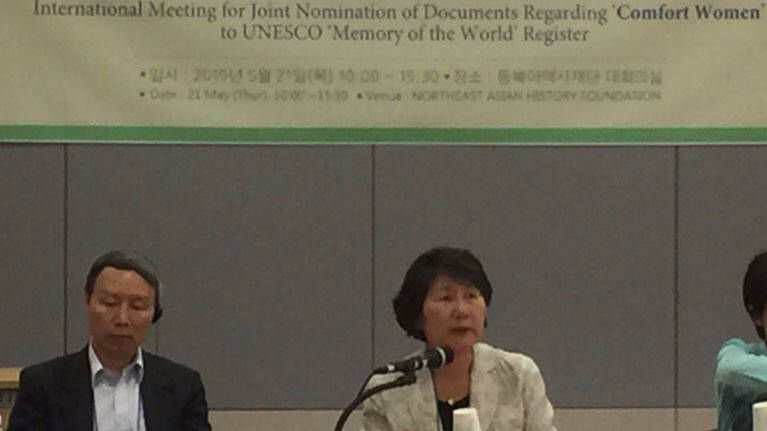
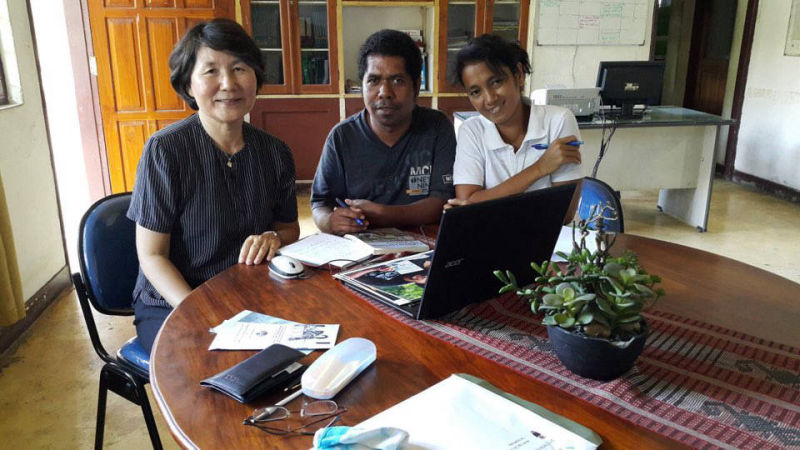
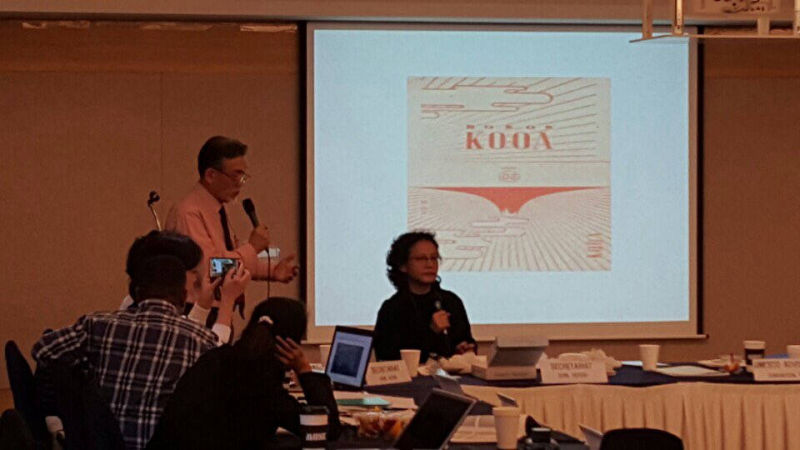
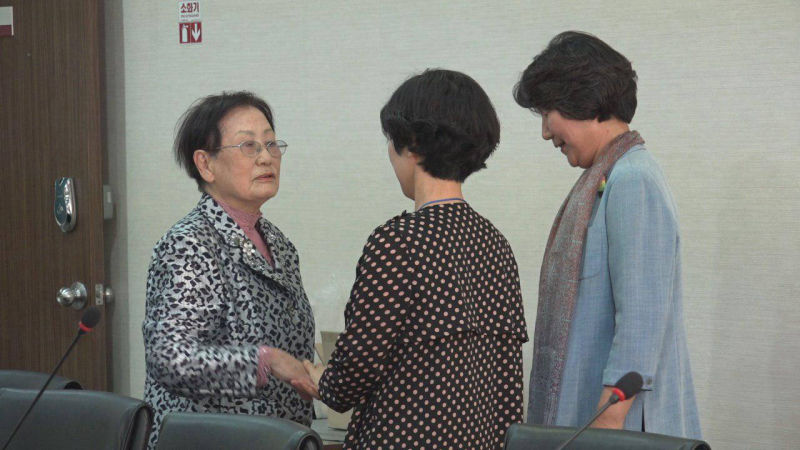
“Throughout the history forever,
we have to preserve the facts of slavery we were forced into.”
In 2014, we, 14 groups from 8 countries as Korea, Japan, China, Taiwan, the Netherlands, the Philippines, Indonesia, and East Timor organized <the International Committee for Joint Nomination of Documents on the Japanese Military ‘Comfort Women’ to UNESCO Memory of the World Register(ICJN)> and have made special efforts to register the documents related to the Japanese military 'comfort women' as UNESCO Memory of the World.
In 2016, we, ICJN, together with Imperial War Museum in England, have applied for the registration of UNESCO Memory of the World with the total of 2,744 documents under the title of “The Voices of 'Comfort Women'”. On February 2017, the documents are valued “unique and irreplaceable” by RSC of UNESCO.
In 2016, some right wing groups in Japan applied for the registration in UNESCO Memory of the World Program with 6 cases, which, they presumed, show Japanese military ‘comfort women’ were not forced to be mobilized and not sex slaves, which was proposedly designed to interrupt our registration. In 2017, IAC in UNESCO, regarding the two applications were in conflict, postponed the decision for registration on either side and suggested ‘talk’ through the third party between two applicants. In the background of such decision were threat to UNESCO not to pay the national contributions and intense lobbying by Japanese government who wanted to block our effort to registration. UNESCO recommended ‘talk’ between two applicants, which is neither for its law nor accorded with its spirit that it is to be fair. As of 2019, there isn’t still any process for ‘talk’.
We, the ICJN, are committed to the process for ‘talk’ proposed by administration office of UNESCO Secretariat.
ICJN requests that the Secretariat the administration office proceed with the ‘talk’ process
fairly and quickly in accordance with the spirit of UNESCO.
ICJN asks Japanese groups to also faithfully join the UNESCO’s process for ‘talk’.
If Japan is a country that respects human rights, it should not interfere with the registration of the documents related with Japanese military ‘comfort women’ as UNESCO’s Memory of the World. Voices of the ‘Comfort Women’ sounds small but strongly speaks out that there is honor and human rights that must be respected.
Please join us with your voices and cry out that preservation of the documents related with the Japanese military
‘comfort women’ is the very way to record and remember the history of recovering female’s human rights.
To the Japanese Military, ‘Comfort Women’ was a euphemistic term referring to the women who were mobilized by the Japan Empire and forced to live under the conditions of sex slavery for the Japanese Army during World War II. The victims were found in almost all Asian territories from Korea (at the time, Chosun) to Taiwan, which both were also once colonies of Japan, with extensions to other conquered areas including Indonesia, the Philippines, Malaysia, Vietnam, Thailand, and East Timor. Japanese citizens were also among those forced into sex slavery as well. After the war, these women and their stories have been abandoned and hidden.
With the dissolution of the Soviet Union at the end of the late 1980s, the collapse of totalitarian rule led to a new evaluation of history as well as a recovery of the voices of war victims in Europe and Asia, particularly with respect to the rise of new democracies and individual human rights. Korea, a nation pitted between and pulled apart by two world powers during the cold war, also brought an end to its military dictatorship through the movement of democratization. Thus, naturally people could begin to openly talk about human rights violations.
In 1991, a victim of Japanese Military ‘Comfort Women’, Hak-soon Kim, took her great courage and opened her life-time shame.… Colony. Sexual victimization. Poverty. Female. Old age. Having suffered from demeaning and degrading status for her long lifetime, Hak-soon Kim eventually realized that all these social and political stigmas that she thought were her own fault were “not my[her] fault.” Her voice resounded, with this short and simple remark, around the world. From the Netherlands to Taiwan and China came the voices of former Japanese Military ‘Comfort Women’ who said, “I [too] was a victim”. With these voices International Solidarity Committee was formed, and its actions have led to a growing consensus evincing Japanese Military’s human rights violations. Responding to these voices and effort, citizens from various countries have worked together for a movement and restoration of ‘human rights’ for the victims of Japanese Military ‘Comfort Women’. The movement has tried to win the sincere and genuine apology, with appropriate liability from Japan. This movement has made a great contribution toward promoting the human rights of women in Asia.
The testimony to inform the truth of victims of Japanese Military ‘Comfort Women’, and the movement, embracing that testimony, to ask for Japan’s sincere and genuine apology are the humanity’s precious effort to recover ‘human rights’ lost and destroyed in the war.
UNESCO has decided the registering list of Memory of the World once in every other year according to the standards as following.
1) (Time) : Is the documents important to understand the historically significant period, or that represents the period in a special way?
2) (Place) : Does the document contain crucial information about a locality important in world history and cultural development?
3) (People) : Is the document related to the prominent individuals contributing world history and culture?
4) (Subject/Theme) : Does the document record important matters in world history or culture?
5) (Form and Style) : Does the document show outstanding aesthetic style?
6) (Social/Spiritual/Community Significance) : Does the document have outstanding scientific, cultural, and spiritual value?
In addition, authenticity, uniqueness, and living significance are followed as extra standards. Standard of uniqueness and living significance refers the documents which is going to be registered are unique and irreplaceable. Also, their loss or damage brings harmful impoverishment to humanity and therefore the documents have historical significance in a certain period of time and in a special culture. Another standard is completeness that means the documents are completed very finely, or peculiar or rare.
The historical significance of the documents on Japanese Military ‘Comfort Women’ is not simply on the tragedy of war victims, but on their way of self-recording, that is, to do testimony, to be understood, and to form sympathy, overcoming their own damaged past. The documents on Japanese Military ‘Comfort Women’ are a record of tragedy of the war which reflects the wide range of war crimes committed by the Japanese Empire during the Second World War. The damage of “Comfort Women’ by Japanese military has been found not only in Asia but also in Europe; there have been male victims as well. Among the documents on Japanese Military ‘Comfort Women’ are historical documents which tell of the system, operation, and return of Japanese Military ‘Comfort Women’, the testimony of the victims and the records of their medical check, and the civil communities’ movement to resolve the problem regarding the victims of Military ‘Comfort Women’. We collected and compiled 2,774 cases of the documents which were once scattered all around the world: Korea, Japan, China, the Netherlands, Taiwan, Indonesia, the Philippines, East Timor, England U.S.A., and Australia, and then applied to the program of UNESCO Memory of the World Register. This pile of documents have been evaluated as “unique and irreplaceable” by the UNESCO registration committee (RSC).
Japan has interrupted our documents to be registered as UNESCO Memory of the World Register. Some powerful groups in Japan have denied the various voices which have evinced the fact that Japanese Military mobilized ‘Comfort Women’ and forced them to live as sex slaves. They have also systematically damaged the statue of ‘Little Girl’, which is a memorial statue made to honor the victims of Japanese Military ‘Comfort Women’ at the main cities in the world. If we do not stop these malicious attempts, there is the possibility that the ‘unique and irreplaceable’ documents related to Japanese Military ‘Comfort Women’ are also to vanish by damage or destruction. UNESCO ought to protect these critical and endangered documents on Japanese Military ‘Comfort Women’ by registering this documentation to the UNESCO Memory of the World Register program.
UNESCO should not be swayed by financial pressure and Japanese government. Please echo the causes and goals of UNESCO Memory of the World Register program that led to the start of this business. Also please don't forget that UNESCO starts this business to improve the accessibility of the world's record heritage, confronting the threats of preserving world record heritage, which include: war and social change, robbery and illegal exchange, destruction, and inappropriate protecting facility.
UNESCO must maintain these rules with resolved in the opposition of the intentions of powerful nations such as Japan who want to exclude these records of weak communities and civil organizations by degrading its authority. When UNESCO shows the firm determination, the world will fully recognize the authority of UNESCO Memory of the World Register.
Signature
Signature :